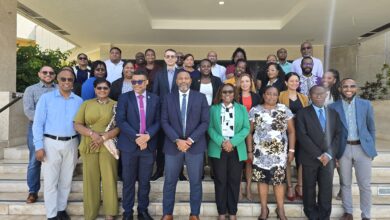Honourable Ministers
Ms. Jacqulyn Joseph and other members of the CARICOM Secretariat
Permanent Secretaries
Representatives of Ministers
Representatives of Regional and International Institutions
Distinguished Guests
Ladies and Gentlemen.
Since assuming the Chairmanship of the COHSOD in October 2002 I have come to appreciate that the development of the human resources of the Community is a complex task. It requires more than the efforts of the Education sector and it can be readily stymied by minor shifts in the external economic environment and political interests. The Community is determined and committed to progressively create equal opportunities for social inclusion.
Simultaneously, we are equally determined and committed to maintain and develop excellence in traditional and new areas, respectively. These collectively provide the context for the challenge given to the Council for Human and Social Development (COHSOD) in the Revised Treaty of Chaguaramas. In this regard I will remind you of the decision made at the Seventeenth Meeting of the Conference of Heads of Government of the Caribbean Community in July 1997. They have emphasized the importance of Human Capital Development to economic development and recognized that international and regional imperatives demand a rethinking of the way in which Human Resources Development was conceptualized, developed and implemented.
The strategy employed by the COHSOD has allowed us to work at the regional level at defining modalities for dealing with the complex task of developing our human resources with equity. The deliberate efforts on the part of professionals in the human and social development sector to define effective frameworks within which to pursue, in an inter-sectoral context, the tasks of conceptualisation, planning and programming are commendable. Already these efforts have begun to bear fruit in some areas. Some examples are the Pan- Caribbean Partnership against HIV/AIDS, The Futures Policy Group and the mainstreaming of gender in education.
The COHSOD recognises the shared leadership provided by the CARICOM Secretariat, the University of the West Indies and other regional institutions such as CXC, CAREC, CDB and OECS Secretariat.
The task ahead now is how to effectively transfer these experiences to the national level. We do not anticipate that this would be easily accomplished. But initial steps have been taken in several Member States to, at a minimum, undertake an inter-sectoral approach in the preparation for participation in the work of the COHSOD. The experiences at developing functional national COHSODs have been varied and unique. I look forward to exchanging views with my colleague Ministers on how to move beyond these initial efforts to improve this mechanism.
On Saturday last, the Chief Education Officers had the opportunity to develop an appreciation not only of the complexity of the task, but also to share experiences and to identify the particular role of the education sector in the inter-sectoral process of the COHSOD. I have been advised that it was an intense period of work but indeed extremely informative and productive.
It has been some time since we, the Ministers of Education, have met to review our role and contribution to the achievement of regional goals and international commitments. As I reviewed the agenda which has a focus on education, it is evident that success in achieving objectives hinges on the effective engagement of several other partners in the process. Not least among these is the engagement of civil society and parents in the delivery of the HFLE and ECED programmes. Access to financial and technical resources continues to be a significant challenge as well and underlines the importance of cooperation at the regional level to make optimal use of available resources.
While the area of culture, one of the cross cutting themes in the regional Human and Social Development Strategy, is not included in the agenda, I intend to take the opportunity to promote CARIFESTA VIII which will be held in Suriname in August 2003. I look forward to personally welcoming the peoples of the Caribbean and visitors to Suriname in August.
I take this opportunity to urge CARICOM and ACP members to confirm their participation for CARIFESTA VIII, officially as soon as possible soon , just as some other countries have already did.
I make this suggestion because it is of great importance for our organization to make a good forecast.
Thank You.





